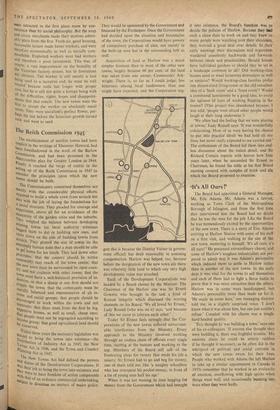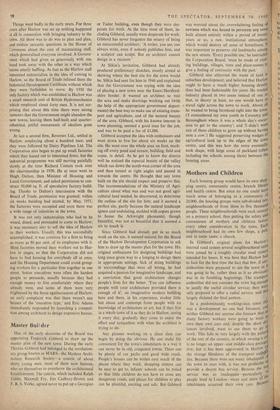'It's AU OurS!'
The Board had appointed a General Manager, Mr. Eric Adams. Mr. Adams was a lawyer, working as Town Clerk of the Metropolitan Borough of Islington, and from the first time they interviewed him the Board had no doubt that he was the man for the job. Like the Board he was tremendously excited by the opportunities of the new town. There is a story of Eric Adams arriving at Harlow Station with some of his staff on a first visit, and walking to the site of the new town, muttering to himself, 'It's all ours, it's all ours!' He possessed extraordinary charm, and some of Harlow's toughest industrialists are pre- pared to admit that it was Adams's personality which induced them to settle in Harlow rather than in another of the new towns. In the early days it was vital for the towns to sell themselves and each of them had to fight a fierce battle to prove that it was more attractive than the others. Harlow was in some ways handicapped. but Adams's personality more than made up for it. 'He made us come here,' one managing director told me, in a slightly surprised voice. '1 don't know what it was about him, but one just couldn't refuse.' Coupled with his charm was a tough, hard-headed quality.
`Eric thought he' was building a town,' says one of his ex-colleagues. 'If anyone else thought they were building it, there was frightful trouble.' His enemies claim he could be utterly ruthless if he thought it necessary, as he often did in the whirlpool of political and social currents in which the new towns swam for their lives. People who worked with Adams (he left Harlow to take up a similar appointment in Canada in 1955) remember that he worked in an avalanche of emotion, overflowing with high spirits when things went well, and occasionally bursting into tears when they went badly. Things went badly in the early years. For three tears after Harlow was set up nothing happened it all in connection with bringing industry to the town. All there was to do was to plan and plan, And endure sarcastic questions in the House of Commons about the cost of maintaining staff, which demoralised everyone involved. A Govern- ment which had given so generously with one hand took away with the other in a way which 'seems utterly baffling. As fast as the Harlow staff interested industrialists in the idea of coming to Harlow, so the Board of Trade refused them the Industrial Development Certificate without which they were forbidden to move. By 1950 the only factory which was established in Harlow was a small research unit of British Hydromechanics which employed about forty men. It is not sur- prising that about this time there were strong rumours that the Government might abandon the new towns, leaving them half-built and quarter- inhabited, pitiful monuments of idealism gone wrong. At last a second firm, Revertex Ltd., settled in Harlow, employing about a hundred men; and they were followed by Dairy Pipelines Ltd. The Corporation also began to put up small factories which they leased out to interested firms; but the industrial programme was still moving painfully slowly at the time Richard Costain took over the chairmanship in 1950. He at once went to Hugh Dalton, then Minister of Housing and Local Government, and asked permission to con- struct 50,000 sq. ft. of speculative factory build- ing. Thanks to Dalton's intercession with the Board of Trade, permission was granted; within six weeks building had started; by May, 1951, the factories were occupied and soon there was a wide range of industries in the town. It was not only industrialists who had to be wined, dined, and persuaded to come to Harlow; it was necessary also to sell the idea of Harlow to their workers. Usually this was successfully accomplished; it was common for a firm to bring as many as 80 per cent. of its employees with it. Most factories moved their workers out to Har- low in stages, so that the Corporation did not have to find housing for everybody all at once, and the Housing Department could avoid group- ing workers for a particular firm together in one street. Seidor executives were often the hardest people to persuade, usually because they had enough money to live comfortably where they already were, and some of them were very frightened by the fierce egalitarianism of Harlow; an early complaint was that there weren't any houses of the 'executive type,' and Eric Adams immediately responded by launching a competi- tion among architects to design expensive houses.











































 Previous page
Previous page